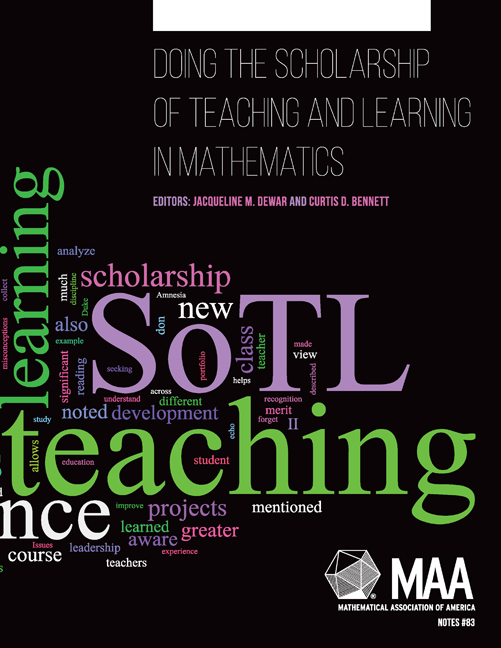15 - Liberal Arts Mathematics Students' Beliefs About the Nature of Mathematics: A Case Study in Survey Research
from Theme 4: - Exploring Student Understanding of the Nature of Mathematics
Summary
Editors' Commentary
Stephen Szydlik's experience teaching a problem-based inquiry seminar for over 10 years led him to question his perceptions about student learning. He lacked empirical evidence about student gains and he couldn't define what he meant by success in his course. This realization led him to a SoTL investigation that required work and reflection in order to frame a researchable question. Particularly worth noting is his description of how he came to define success in the course based on his desired outcomes. His realization that success meant student progress in the higher order activities inherent in doing mathematics led to a study of mathematical beliefs. His discussion of designing survey items about them, and checking for validity and reliability, is another highlight of the chapter. He also provides details of applying to his Institutional Review Board and a detailed discussion of options for publishing his work.
Introduction
Mathematics is a living subject which seeks to understand patterns that permeate both the world around us and the mind within us—Everybody Counts (National Research Council, 1989).
What is mathematics? Debated by mathematicians and philosophers of mathematics for hundreds of years, the question is not settled and likely never will be. However, there is little doubt that student conceptions of mathematics are considerably different than those of professional mathematicians.
In this chapter, I describe a Scholarship of Teaching and Learning (SoTL) project that explored the mathematical beliefs of students in two sections of a problem-based general education mathematics course, the problem-based inquiry seminar (PBIS) at the University of Wisconsin Oshkosh. The PBIS course was designed to give students brief but authentic experiences in doing mathematics. Students are asked to collect data, look for patterns, make conjectures, model physical situations, and make logical arguments. Most of the students lack experience with these practices and are initially uncomfortable being asked to do them. Nevertheless, it appears that over the course of a semester, some students change their conceptions of the nature of mathematics. In their communication of mathematics, both formally and informally, these students show signs that they begin to see mathematics as a logical and consistent discipline.
Information
- Type
- Chapter
- Information
- Doing the Scholarship of Teaching and Learning in Mathematics , pp. 145 - 156Publisher: Mathematical Association of AmericaPrint publication year: 2014
